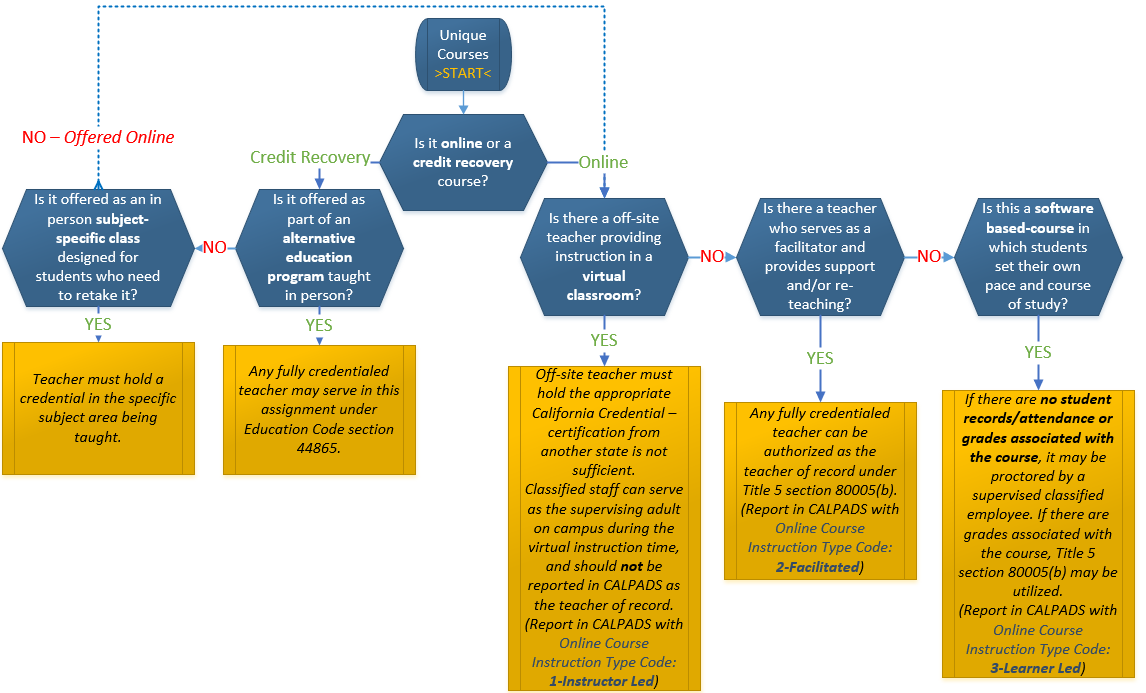Online and Credit Recovery Courses
Online and Credit Recovery courses may vary by district, or even by school site. The credential required for such courses depends on how a course is offered. The information provided below is designed to serve as guidance only. Local educational agencies are responsible to thoroughly review relevant Statutes and Regulations and determine the appropriateness of an assignment at the local level.
If a course is offered as part of an Alternative Education Program, such as Independent Study, then any fully credentialed teacher may serve in this assignment under Education Code section 44865. This includes Online and Credit Recovery courses that are completed independently by the student at home/on their own time, and are not part of a school-based class.
When an Online or Credit Recovery course uses a software-based program where each student sets their own pace and course of study, and there are no student records/attendance or grades associated with the course, then it may be proctored by a supervised classified employee. If there are grades associated with the course, Title 5 section 80005(b) may be utilized. This course should be reported in CALPADS with Online Course Instruction Type Code: 3 Learner Led.
If the online course has a teacher who serves as a facilitator and provides support and/or re-teaching, then any fully credentialed teacher can be authorized as the teacher of record under Title 5 section 80005(b). This course should be reported in CALPADS with Online Course Instruction Type Code: 2-Facilitated.
Note: The options above require the educator to hold a teaching credential that was issued based on a bachelor's degree and student teaching, and the assignment requires the teacher's consent.
When a Credit Recovery course is offered as a subject-specific departmentalized class designed for students who did not pass a course on their first attempt, then the teacher would need to hold a credential authorizing the content area being taught, or be assigned on an appropriate local assignment option.
The same is true for an Online course where the instruction occurs in a virtual online classroom by a teacher of record who provides all instruction and assigns the grade. The teacher assigned to such an Online course assignment must hold the appropriate California credential and cannot serve on a credential from another state. If the student(s) completing such an online course are in a classroom on campus, then the individual supervising the student(s) may be a classified employee. The supervising classified employee should not be reported in CALPADS as the teacher of record. This course should be reported in CALPADS with Online Course Instruction Type Code: 1-Instructor Led.

Contracted Employees Teaching Online Courses
It is the responsibility of the local educational agency (LEA) or charter school to ensure that all employees providing instruction to students have satisfied professional fitness requirements and hold the appropriate authorization(s) for the assignment, regardless of the method of delivery of instruction. This applies to all educators providing instruction, including employees contracted through virtual education service from around the country to provide instruction through online courses.
For example, if an off-site teacher is providing instruction in a virtual classroom, this teacher must be properly authorized by holding the appropriate Commission-issued California credential for the assignment, including the appropriate authorization for English Learners if the class consists of one or more English Learner. Certification from another state is not sufficient.
Pursuant to Education Code §44065 any person employed by a school district or county office of education working in a position in which 50 percent or more of their duties consist of directing, coordinating, supervising or administering the functions outlined in statute, including instruction to pupils, must hold a valid appropriate Commission-issued credential for the assignment.
Previous law allowed for credentialing flexibility for charter school teachers who were teaching non-core curriculum, however educators teaching core academic subject areas were required to hold the appropriate credential for their assignment. This included educators teaching or providing instruction in core academic subject areas via an online or virtual classroom environment. The passage of Assembly Bill (AB) 1505 removed the assignment flexibility for non-core, non-college preparatory courses and requires all charter school teachers to hold the appropriate credential for their certificated assignment. Therefore, educators who have been teaching core academic subject areas in an online or virtual classroom environment should already hold the appropriate credential and consequently also have satisfied the Commission’s professional fitness requirements.
.png?sfvrsn=c28b72b1_10)
.png?sfvrsn=cd8b72b1_0)